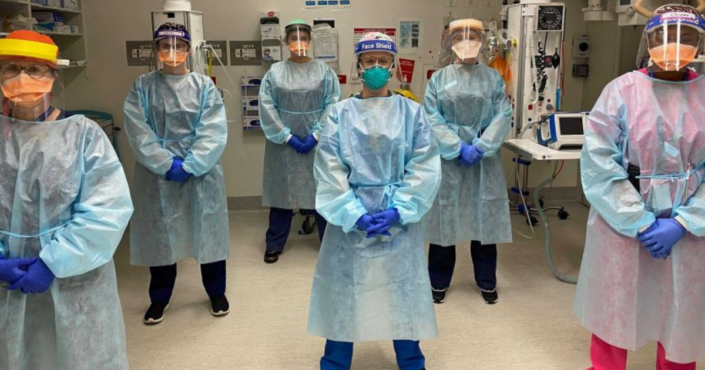Hospitals in desperate need of nurses to ensure appropriate patient care during unforeseen circumstances may issue lucrative travel nursing crisis contracts to lure qualified nurses to their facility until the “crisis” has been resolved. These temporary employment agreements between registered nurses (RNs) and healthcare facilities, usually a hospital, are offered when there’s a shortage of nursing staff due to various reasons, such as natural disasters, seasonal fluctuations in patient census, pandemics or other circumstances that cause a surge in patient admissions. Learn how crisis contracts differ from regular travel nursing jobs, the reasons hospitals may offer them and why they usually pay well above the average travel nursing salary.
What’s the Difference Between Crisis Contracts and Regular Contracts?
While travel nursing crisis contracts operate similarly to regular travel nursing contacts, there are usually several key differences between the two. Both types of travel nursing contracts involve temporary assignments for RNs in different healthcare facilities around the nation. Due to the constantly changing work environment, both require nurses to possess strong clinical skills and be flexible and highly adaptable. Both types of contracts also offer competitive compensation packages, but crisis contracts tend to be even more lucrative.
Here are 6 key components of travel nurse crisis contracts:
- Length of contract: Traditional travel nursing contracts generally last 13 weeks. However, it’s possible to find some shorter ones, but these are often strike contracts. You may also find some that are longer. However, most start at 13 weeks and then, with extensions, end up lasting longer. Crisis contracts are specifically designed to address temporary staffing shortages during a high-demand crisis situation, so these contracts could last just a few weeks. During the COVID-19 pandemic, one of the most severe crisis situations the nation has faced, travel nurses found crisis contracts of four, six and eight weeks. One company even offered two-week contracts but required 12-hour shifts.
- Rapid response requirement: Regular travel nursing contracts usually allow nurses to plan in advance where they want to go and when they want to work, hence the appeal of travel nursing. Hospitals anticipate staffing needs and plan for coverage, such as when they need temporary absences covered, such as maternity leave. Conversely, crisis contracts usually arise from an unforeseen situation, thus an unplanned need for more nurses. They’re initiated in response to an urgent need, so hospitals require immediate assistance to maintain patient care standards. Travel nurses must meet the rapid response required to apply for crisis contracts, sometimes requiring them to report for duty within as little as 48 hours.
- Weekly hourly commitment: Traditional travel nursing contracts generally require 36 or 40 hours per week, with schedules including 5 days of 8 hours, 4 days of 10 hours or occasionally 3 days of 12 hours. Many high-paying crisis contracts require you to work more than 40 hours per week, with most travel nurse crisis contracts requiring 48 hours per week, but some ask for 60 hours, with 12-hour shifts often the norm. Keep this in mind when you’re browsing contracts because the gross salaries listed include the overtime rate. One of the highest-paying agencies during the pandemic required 6 days on, followed by 1 day off, for two weeks or more, which can be an exhausting pace for extended periods. If you choose to take a contract with an OT commitment, mentally prepare yourself and make sure you’re taking care of yourself on your days off!
- Assignment availability: Crisis contracts are more prevalent during times of crisis or unexpected events when there’s an acute need for nurses, so the assignments may be limited. For example, the crisis may only be occurring in a specific geographic area, so contracts are only available there while the crisis is active. If this crisis were due to a natural or manufactured disaster, patients would likely arrive with traumatic injuries that require nurses with emergency or intensive care skills. On the other hand, regular travel nursing contracts are available throughout the year in various locations, allowing nurses to choose from a broader range of assignments based on their specialization, desired clinical setting and other preferences.
- Expectations and flexibility: Chances are, the hospital is paying big money to hire travelers because they’re overwhelmed by the number of patients requiring care. As a crisis traveler, you’re expected to be super-flexible in scheduling and floating to other units. However, crisis situations often require nurses with critical care experience, meaning you’ll likely remain in emergency, trauma or intensive care units (ICUs). Wherever you end up, you’re there to take care of patients, and trauma or critical care may be the only type of patient you have contact with.
- Average pay: Speaking of big money, pay for crisis contracts tend to be much higher than regular travel nursing contracts due to the urgency of the assignment. The additional pay is intended to attract nurses to work in challenging, high-demand situations. Additionally, crisis contracts may include other incentives or benefits to compensate for the job being very short-term and for the inconvenience of having to move quickly.
Regarding pay, regular travel nurse contracts may have an average taxable hourly wage of around $20 per hour, depending on the location, specialty and many other factors. Added to this are untaxed housing stipends and per diems for meals and incidentals, if you qualify, for an average blended rate of around $50 to $70.
Stipends on crisis contracts are often topped out, so travel nurses may have a higher taxable hourly wage of up to $40 and a blended rate closer to $90 per hour. However, crisis contracts often include a hotel because you don’t have time to find housing and start working quickly and a rental car because the urgency usually requires you to fly to the location instead of driving. When the crisis contract includes these extras, expect your wages to be almost fully taxed minus a small per diem.
RELATED: Dollars and Sense: Travel Nurse Salaries Explained
Remember that the specific terms and conditions of both crisis contracts and regular travel nursing contracts vary between travel nursing agencies and healthcare facilities. Nurses considering either type of contract should carefully review the details, including location, assignment duration, compensation and other specific requirements, before accepting an offer.
Why Do Hospitals Issue Crisis Contracts?

Hospitals use crisis contracts to address staffing shortages and ensure the delivery of essential healthcare services to patients. A few reasons why hospitals opt for crisis contracts include:
- Sudden patient surge: Hospitals may experience a sudden, unexpected increase in patient volume due to a major accident, natural disaster or public health emergency that overwhelms the existing nursing staff. Hiring travel nurses on crisis contracts allows hospitals to quickly fill the gaps and maintain appropriate staffing levels to provide adequate patient care until the crisis ends.
- Flexibility and rapid response: Crisis contracts offer hospitals the flexibility to respond rapidly to unforeseen events or emergencies. They can bring in travel nurses with specialized skills or experience to handle specific patient populations, medical conditions or critical care units to get a handle on the situation as swiftly as possible.
- Freedom and ability to move quickly: Travel nurses are willing to relocate temporarily to areas facing crises and have the ability to hit the ground running. Hospitals can tap into this pool of healthcare professionals to fill their staffing gaps much more quickly than they can onboard new staff nurses who may not be needed once the crisis passes.
- Expertise and experience: Travel nurses who take crisis contracts typically have diverse clinical backgrounds and experience working in different healthcare settings. Their experience and acquired skills mean they can go to work right away, with little to no orientation to temporarily support overwhelmed local healthcare professionals.
- Temporary solution: Crisis contracts provide a temporary solution to address immediate staffing needs the hospital doesn’t expect to continue beyond the current crisis. Hospitals hire travel nurses for a specific duration, usually just a few weeks or until the situation stabilizes.
Natural disasters, such as earthquakes, tornadoes, hurricanes or wildfires, have traditionally been the primary reason for crisis contracts. Healthcare facilities in the impacted areas experiencing a surge in patient volume due to injuries or disaster-related health issue crisis contracts to bring in outside nurses to help support their local staff and temporarily manage the increased patient load.
During the COVID-19 outbreak, crisis contracts became the norm at facilities around the country as the novel coronavirus flooded emergency rooms at hospitals nationwide. The ability to recruit travel nurses to provide specialized care in ICUs or dedicated COVID-19 treatment units was crucial in supporting local response efforts and maintaining healthcare services for the flood of patients that not only overwhelmed staff but also sometimes overwhelmed the facilities themselves.
The unprecedented need for travel nursing crisis contracts during this historic pandemic reshaped the nature and demands of these assignments. The pandemic also highlighted the critical role travel nurses play in crisis response and emphasized the importance of their support in challenging situations. The number of hours travel nurse contract hours soared, as did wages.
Why Do Crisis Contracts Pay So Much?
Aside from the stress of working so many shifts in a row, travel nurses taking crisis contracts are often asked to fly to a location without knowing what facility or shift they’ll be working. They often don’t know exactly what they’ll be walking into and tend to work more hours and in intense situations. Thus, crisis contracts typically pay more than regular travel nursing contracts. Some specific reasons why these contracts are generally highly lucrative include:
- Severe staffing shortages: While regular travel nursing contracts also cover staffing shortages, crisis contracts may arise when these shortages are significant and/or unexpected due to a crisis situation. The substantial imbalance between supply and demand creates a competitive environment, leading hospitals to offer higher rates to attract qualified travel nurses to fill immediate staffing gaps.
- Urgency and immediate response: Healthcare facilities have an urgent need to quickly secure additional nursing staff in crisis situations to maintain patient care standards. The immediate response required from travel nurses warrants higher compensation as an incentive to promptly join and support the facility during the critical period.
- Challenging work environment: Crisis contracts often involve working in challenging environments such as disaster-stricken areas, high-intensity care units or overflowing hospitals. The nature of the work, increased patient acuity and the potential for longer, more demanding shifts contribute to higher compensation.
- Specialized skills and experience: Crisis situations often call for nurses with specialized skills and/or experience to effectively handle the unique challenges posed by the crisis. Nurses with expertise in urgent care are often among the highest-paid RN specialties under normal circumstances, but nurses experienced in critical care, emergency medicine, infectious diseases or disaster response are in even higher demand during certain crises and command higher pay rates.
- Disruption to personal life: While travel nursing requires nurses to leave their homes, families and friends for the length of each contract, crisis contracts typically involve leaving with very little notice, sometimes literally just a day. The increased compensation acknowledges the disruption to their personal lives and compensates for inconveniences or sacrifices to complete crucial assignments.
It’s important to note that while crisis contracts may offer higher pay rates, they aren’t as common as regular travel nursing contracts, meaning they may not provide the same level of job stability. Nurses considering crisis contracts should always carefully evaluate the duration, compensation and potential risks before accepting an offer.
Browse healthcare jobs on Vivian to find your next travel, staff, local contract or per diem position faster and easier than ever. Click “Urgent Needs” if you’re seeking a position that starts ASAP and put your skills to work in a facility with an immediate demand for experienced travel nurses.










I am looking for Register Nurse Covid vaccine clinic work as vaccines will begin mid December.
I am presently working with Covid vaccine research and would like to transition.
I am passionate about being apart of the battle and protecting life.
Thank you, Paula Sapala